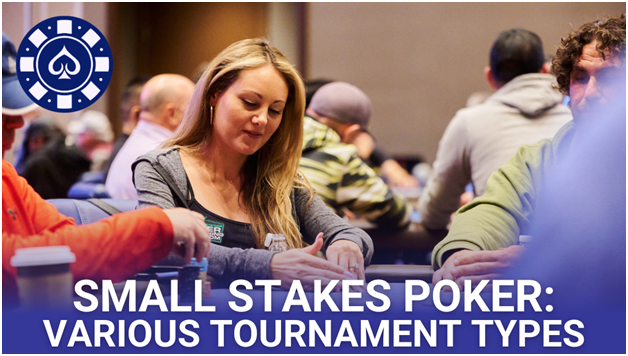In the world of poker, small stakes tournaments can come in various forms, depending on whether you are playing online or live. Typically, they fall into three categories:
- Multi-Table Tournaments (MTTs)
- Sit-N-Go (SNG) Tournaments
- Heads-Up (HU) Tournaments
When playing live, a small stakes tournament could be considered anything up to a $500 buy-in. However, in online poker, small stakes tournaments can be anything below $100, sometimes even free!
In a live poker tournament, each player pays a fixed buy-in and receives a set number of chips. They are then assigned a table and seat number, and they receive their initial stack of chips. The goal is to outlast opponents, aiming to finish “in the money” (ITM), where players are guaranteed a share of the prize pool.
Why Play Tournaments?
Tournaments can mean substantial payouts for those who make it deep into the game. Unlike cash games, where there is a ceiling, tournament payouts are top-heavy, meaning significant cashouts for those who hit that top score.
For example, in a cash game, a good player can win about 10 times the big blind per hour. So, if you’re playing $1/$2 no limit hold’em, you can expect to win about $20 per hour (because 10x the $2 big blind = $20).
In a tournament, a $500 buy-in tournament pays about 15% of the field, meaning only 15% of people will even cash. First place is usually somewhere between 10%-15% of the total prize pool. So let’s say the total prize pool for a $500 buy-in tournament is $500,000. If you win the tournament, you can expect to take home between $50,000 and $75,000.
Key Differences: Cash Games vs. Tournaments
- Stack Preservation:
- In cash games, you can re-buy chips at any time, unlike tournaments where players start with a fixed stack.
- Risk Management:
- In tournaments, chip preservation is crucial, as one wrong move can end your tournament run.
- Game Selection:
- In cash games, you can choose your table, while in tournaments, seating is random.
- Duration:
- Cash games allow flexible playtime, but tournaments demand commitment until there is a winner.
Different Types of Tournaments
There are many types of small stakes tournaments and it’s important to know how to make the proper strategy adjustments for each. Variations include deepstack, turbo, super-turbo, MTT, freezeout, re-entry, bounty, free-roll, satellite, heads-up, shootout, and sit-and-go, just to name a few!
- Re-entry Tournaments:
- Players can re-enter if they bust out, giving them multiple chances to win. It’s essential to identify opponents who plan to rebuy early, as they often take high variance lines and are willing to put their chips in on draws and moderate pairs.
- Bounty Tournaments (aka Knockouts):
- Players earn cash prizes for eliminating opponents. It’s important not to arrive late to maximize your chances of busting opponents, especially since recreational players tend to make mistakes early on. Focus on building your stack to cover opponents and win their bounties.
- Satellites:
- Qualifying events for higher buy-in tournaments.There are no payouts; it’s win or lose. To increase your chances, play aggressively early on to build a stack. Focus on survival over chip accumulation as you approach the bubble. Since middling stacks tend to tighten up, you can advance by letting short stacks bust.
- Heads-Up Tournaments (HU):
- Players compete against a single opponent per table.The hand range widens significantly, with around 80% of hands playable from the button. Heads-up play involves more hands and increased bluffing compared to full ring tables, making it higher variance.
- Shootouts:
- Players compete to win their table and advance to the next round or final table. Shootouts mimic a final table since they play down to one winner, helping you learn to play short-handed. The fewer the players, the wider your ranges should be.
- Sit-and-Go Tournaments (SNGs):
- SNGs start when enough players (usually five or six) register. Initially, play tight with small blinds and antes. As blinds increase, ramp up aggression. When the SNG is three- or four-handed, widen your ranges and build a stack so you can position yourself to win.
Ready to Play?









